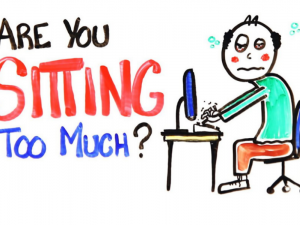You know a sound night of sleep can do wonders for your energy levels, your appearance and even your outlook on life ... but did you know it might also be instrumental in keeping you trim? Accumulating research is showing that getting enough shut-eye is crucial for your waistline, and if you've been skimping on sleep -- even by just an hour or two - it could be making you fat.
Case in point, a study published in the journal Sleep
confirmed that those who got five hours or less of
sleep a night gained more abdominal fat than those
averaging six or seven hours of sleep a night. The
findings support the theory that when you skip out on
sleep you risk weight gain and place yourself in a
higher risk bracket for diabetes and heart disease,
two health conditions that go up in risk as your
middle section expands.
The study participants reported their sleep habits, diets, exercise levels and other lifestyle factors while researchers measured their abdominal fat at the onset of the study and again after a five-year time span.
Important findings revealed:
- Short sleepers (those who slept five hours or less each night) experienced a 32 percent gain in visceral fat (fat surrounding the abdominal area and organs, which is linked to everything from bad cholesterol and hypertension to diabetes, heart disease and stroke) versus a 13 percent gain in the participants who slept six to seven hours a night.
- Researchers suggested a possible link between sleep loss and disrupted levels of appetite-regulating hormones, causing bouts of overeating
In a separate study published in Cell Metabolism, researchers found that brain cells easily excited by stress - the hyocretin/orexin cells located in the hypothalamus region - could also be involved in how lack of sleep could make you pack on the pounds.
The lead author of the study, Tamas Horvath, associate professor in the Departments of Obstetrics, Gynecology & Reproductive Sciences (Ob/Gyn) and Neurobiology at Yale School of Medicine, described how these overexcited brain cells trigger overeating in Medical News Today:
"If these neurons are over-activated by environmental or mental stress in daily situations, they may support sustained arousal, triggering sleeplessness, leading to overeating. The more stress you have, the lower the threshold becomes for exciting these hypocretin neurons."
As society continues to move toward a 24-7, multi-tasking and getting by on less and less sleep way of life, the consequences of sleeping less than five hours a night are resulting in more than throwing the body out of sync for the day, it is also making us vulnerable to many health dangers.
According to the American Journal of Public Health, obesity causes about 300,000 deaths per year in the United States and new shows it is now the leading cause of preventable death in the United States, contributing to disease even more than smoking. In addition to obesity, not getting enough sleep also places people at risk of other serious health conditions such as cancer, heart disease and diabetes.
Give up Sleep, Give up Your Health
A sleep-deficient lifestyle can weigh heavy on your heart and overall health. Studies suggest that when the body doesn't get enough sleep it goes into a state of high alert, resulting in the increased production of stress hormones and inflammation in the body along with elevated blood pressure levels, all of which places you in the high risk category for heart disease, stroke, cancer and diabetes.
"Based on our findings, we believe that if you lose sleep that your body needs, then you produce these inflammatory markers that on a chronic basis can create low-grade inflammation and predispose you to cardiovascular events and a shorter life span," Alexandras N. Vgontzas of Pennsylvania State University told The Washington Post.
Other studies found people that work the night shift experienced reduced levels of the hormone melatonin, which works to prevent tumor cells, thus placing them at an increased risk of developing breast and colon cancers.
Even when a person tries to change their biological clock, their body continues to try to control the sleep/wake cycle and adjust it back to a normal day/night schedule. This is why people that work the night shift naturally feel sleepy when the sun goes down. It is possible to reset the biological clock, but only by two hours per day and with using specific light cues such as creating darkness in the bedroom as well as altering eating and exercising patterns.
So if you try to cheat sleep for too long, it could easily make you gain weight, and being overweight creates a perpetual, negative snowball effect on your health. First, it can cause dangerous sleep-related disorders like sleep apnea, a disorder where your breathing starts and stops throughout the night. This happens when the airway of the obese individual becomes obstructed by large tonsils, enlarged tongue and increased fat in the neck that constrict the airway when the throat muscles become relaxed during sleep.
This deadly combination of being overweight and not getting a full night's sleep also makes you a prime candidate for developing diabetes. This is because the body's reaction to sleep loss can mimic an insulin-resistance reaction. Since the role of insulin is to help your body properly use glucose, when the body senses resistance, blood sugars rise acting as a precursor to diabetes.
What's Keeping You up at Night? How to Get the Sleep You Can't Afford to Lose
It's clear that getting a proper amount of sleep is the foundation of good health, but the burning question is "How do you do that?"
Although experts claim there isn't a magic number when it comes to optimal hours of sleep, studies found that people who sleep between 6.5 and 7.5 hours a night live the longest. Rather than staying awake at night counting sheep or thinking of ways to fall asleep you can use the below guidelines to help you fall asleep and stay asleep.
11 Steps to Restful Sleep and Rejuvenation
Take control of your restless nights and gain the
valuable sleep your body needs by following these
healthy sleep habits.
- Stay away from stimulants such as caffeine,
nicotine and alcohol before bedtime
The rule of thumb is to stop any stimulants such as cigarettes, coffee, tea, chocolate and soda four to six hours before going to bed. While alcohol initially induces sleep, it eventually produces stimulant effects after a few hours into the night, causing several moments of awakening and negatively affecting the quality of sleep. For this reason you should avoid alcohol up to three hours before bedtime.
- Turn your bedroom into a sleep-inducing environment
The best sleep environment for your bedroom is quiet, dark and cool. This means keeping computers, TVs and disruptive pets out of the bedroom. Think of your bedroom as a sanctuary for reading, sleeping, sex and nothing else. You can block outdoor noises such as cars or trains going by with a set of earplugs or invest in a sound machine that plays "white noise."
Light can be kept out by hanging heavy curtains, blackout shades or using an eye mask. Keeping light out is especially important if you work the night shift and sleep during the day as light is a powerful signal to your brain that it's time to wake up. A comfortable sleep temperature that induces quality sleep is anywhere between 60 and 75°F. And don't forget about the importance of a high-quality mattress and pillows. If your mattress is past 10 -years old, it's time for a new one.
- Turn the alarm clock away from you
Try to keep it at least three feet from you and out of view so you don't wake up at night obsessively checking the time. Also, avoid using clocks with jarring alarms as they produce a lot of stress on the body when it's jolted awake suddenly by a blaring sound.
- Don't eat dinner late and if you do, make it light
Ordering a pepperoni pizza at 10 p.m. is a sure-fire recipe for indigestion and insomnia. Your best bet is to finish your dinner several hours before going to bed. If you feel the need to snack closer to your bedtime then try some snacks that won't keep you up at night like almonds, raisins, cereal or yogurt.
- Exercise earlier in the day
Exercise can not only help you fall asleep faster, but it also promotes a restful sleep. The key is exercising at least three hours before going to bed or get your workout done early in the day. Because exercise works as a stimulant by releasing the stress hormone cortisol that awakens the brain, you don't want to receive its effects just before going to sleep. If you feel the need to engage in some sort of physical unwinding you can try some gentle stretches or yoga poses to prepare you for bedtime.
- Establish a soothing pre-sleep routine
Begin winding down by following established bedtime rituals an hour before going to bed. You can relax your mind and body by taking a bath, reading a book, doing some gentle stretches or meditating. Avoid getting into emotionally charged discussions with your partner before bed and if you're concerned about taking your problems to bed with you, write them down in a journal and retire it for the night.
- Learn to relax
This may sound easy, but how many of you reading this actually schedule time into your day to relax and enjoy life? Your body and mind know how to relax - you just need to give them "permission" to do so. This is easier said than done, of course, so for those of you who need a little help, we highly recommend the Sleep Easy CD. With guided sleep meditations by a leading meditation expert, Mary Maddux, and music by a renowned meditation music composer with 20 years experience, this CD will help you find deep rest and sleep.
- Keep your bedtimes the same, even on the weekends
Even if you're tempted to stay up to watch that late-night movie on the weekend, don't do it as it will throw your body's sleep cycle out of sync. If you feel inclined to change your bedtime to an earlier or later time, do it in small 15-minute increments to allow your body to adjust.
- Make up for lost sleep with a cat nap
Forgo the desire to sleep in and instead catch up on your lost sleep with a daytime nap. This way you won't throw off your natural sleep wake-rhythm. Take a smart nap by doing it in the early afternoon and limiting it to 30 minutes. You should avoid naps if insomnia is an issue for you as it can worsen the symptoms.
- Resist the after-dinner drowsies
Don't give into the drowsies just after eating dinner because chances are you'll end up waking up in the middle of the night and have difficulty getting back to sleep. If you find yourself feeling sleepy, start moving by getting off the couch and doing mildly stimulating activities such as cleaning up the kitchen, calling a friend or finding an outfit to wear the next day.
- Support sleep with high-quality supplement solutions
In addition to the lifestyle steps noted above, there are highly effective synergistic supplement formulations available to discuss at your next Doctors appointment which may help support a restful night's sleep:
----------------------------------------
Sources
Sleep, Volume 33, Issue 03
American Journal of Preventive Medicine. Volume 38, Issue 2 , Pages 138-144,
Reuters
Cell Metabolism: 1(41:279-86.
Medical News Today
The Washington Post
American Journal of Public Health
National Institutes of Health. National Heart, Lung, and Blood Institute, National Center on Sleep Disorders Research "Sleep, Sleep Disorders and Biological Rhythms"
Harvard Medical School Division of Sleep Medicine "Twelve Simple Tips to Improve Your Sleep"





